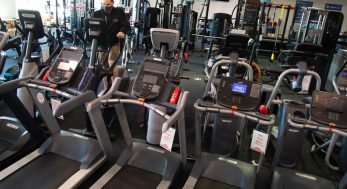Last summer, I lived in a hotel for nearly three months.
What I had hoped would be a disciplined season routine of settling into a new place unfurled into taking it day-by-day and living in a makeshift, temporary “home.” With fluctuating schedules and priorities, I could no longer rely on my regular workout schedule.
My at-home equipment was stuffed, sealed and stacked in moving boxes. I still taught group fitness courses for my local YMCA, but on days when I wasn’t teaching, how would I continue conditioning? Both as a fitness professional and stressed-out human, I needed to maintain my physical and mental health – but in an uncertain environment.
There are two kinds of fitness routines: the realistic and unrealistic. Here are ten tips ensure you focus on the latter: a sustainable routine that builds a better you.
Determine an ideal time of day for your fitness routine
 Setting the right time to work out is the first step to success — Photo courtesy of E+ / filadendron
Setting the right time to work out is the first step to success — Photo courtesy of E+ / filadendron
In stressful times of transition, it may be difficult to know what our daily schedule will look like. Think ahead and plan as best you can, even if it’s determining the night before when you’ll be able to squeeze in exercise the following day.
When considering when to work out, imagine what’s sustainable. Waking up at 4:00 a.m. every morning to exercise may not work long-term. Consider your daily ebbs and flows of energy. Is there a time of day when you need an energy boost? That may be the ideal time for a brief workout.
Ultimately, a daily routine that is consistent on a weekly basis is ideal, so make that your aim.
Set a time limit
When we establish and maintain any routine, building tiny habits works best. Begin with seven to 15 minutes of light exercise, including warm-up and stretching cool down. You can increase your routine slowly, not to exceed more than 45 minutes per day, including bookends for raising your heart rate and cooling down.
Wear a watch or set a phone time to stay on track. Keeping your exercise time-limited sets you up to win. If you only have five minutes, do gentle stretching.
Map out an exercise plan (daily type of regimen)
 Work with what you have at home — Photo courtesy of E+ / adamkaz
Work with what you have at home — Photo courtesy of E+ / adamkaz
With so many resources online, there are many ways to make an exercise plan. Alternate your days with cardio, strength training (you can use canned goods if you don’t have weights at home), body-weight training, yoga and core work.
If you have joint pain, standing Barre using a chair or stool is an excellent, low-impact choice that incorporates full body movement.
Follow all guidelines, modifications, and directions
As with any physical activity, always consult your healthcare provider. If you utilize videos at home, make sure you have a safe environment and follow all directions. Ensure the videos are produced and taught by a certified fitness instructor or professional gym.
I suggest the YMCA’s Y360, as the Y is a nationwide non-profit organization that specializes in all fitness levels. Planet Fitness also offers free online classes.
If you have an injury or chronic health condition, consider a long-term investment in a personal trainer who can adapt and modify a regimen for you. Remember: No exercise is worth injury and/or exacerbating a health condition. Be sure to seek professional guidance.
Keep it simple
 Move your body in ways that show it love — Photo courtesy of E+ / PeopleImages
Move your body in ways that show it love — Photo courtesy of E+ / PeopleImages
When I first began my fitness journey, I started at home in the morning with five minutes of stretching before work. My friend and certified yoga instructor, Blake, records simple, short routines that are manageable. It doesn’t have to be complex. Your body needs movement and love, not punishment.
Don’t overexert yourself
As a group fitness professional, I see student burnout all the time. Take it easy. If you’re working out at home during a stressful time, a little goes a long way.
The “go big or go home” mentality is not necessarily sustainable in fitness. Taking care of your body is a lifelong endeavor. Treat it as such and avoid unnecessary exertion that leads to quitting or injury.
Don’t hesitate to have fun and change it up
 Keep your fitness fun — Photo courtesy of E+ / zeljkosantrac
Keep your fitness fun — Photo courtesy of E+ / zeljkosantrac
If at any time you feel pain, modify your exercise or the entire fitness routine. But if you feel bored, consider a different type of exercise (swap cardio for strength training, for example). In order to maintain a fitness routine, it must be fun, enjoyable and slowly nudge you toward challenge.
Eating well is an essential part of the equation
Consider healthy habits to be the foundation to any fitness regimen. Heart health begins in the kitchen. If you’re unsure where to start, check out these tried-and-true Weight Watchers resources.
Do a little every day
 Stretching is the best place to start — Photo courtesy of iStock / fizkes
Stretching is the best place to start — Photo courtesy of iStock / fizkes
Remember, five minutes of stretching each day is a great place to start and to maintain in stressful times. You’ll be surprised at how just getting started encourages you to keep going.
Celebrate your success
Every time you work out, say aloud, “I’m so proud of you!” Positive reinforcement is key to fitness maintenance. Negativity doesn’t work. Encouragement does. Remember, there’s realistic and unrealistic. To focus on the latter, be your own cheerleader.
Starting and sustaining a fitness routine amid a stressful situation is tough. These tips will help you stay on course and be gentle and flexible. I’d love to hear about your fitness journey; share and tag me on Instagram, Twitter, Facebook. Visit me at YouTube.



